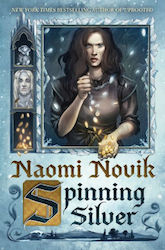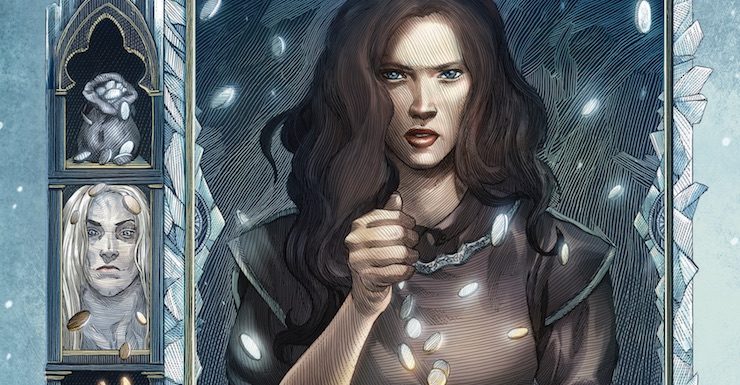There’s a strange phenomenon whereby one truly enjoys a novel, admires it for its craft and emotional impact, and still finds one element painfully frustrating.
Naomi Novik’s Spinning Silver is just such a novel, a glittering jewel of a novel influenced by fairytale and by—as far as I can tell—the history of medieval Hungary. Miryem is a moneylender’s daughter, who takes over her father’s business because he’s too soft-hearted to actually demand repayment. She’s so good at it that the Staryk—beings of winter who covet gold—come to believe she can turn silver into gold, and one of them sets her a challenge with her life as the stakes. Victory won’t bring her any joy, either: if she wins, the Staryk king will take her to be his queen, far from home.
Miryem’s one friend—of sorts—is Wanda, a young woman with a drunken brute for a father and two younger brothers who rely on her. Wanda comes into Miryem’s life as a servant, working off her father’s debt, but Wanda sees this as an escape from a future she doesn’t want. Miryem and Wanda eventually become to be allies in the goal of giving Wanda the freedom to make more of her own choices.
Meanwhile, Irina is the daughter of a nobleman. When her father buys her jewelry made from Staryk silver, she attracts the attention of the tsar—a young man, but one whom Irina discovers is possessed by a demon who wants to consume her. Irina must play a careful game to preserve her life, and to act for the good of her country, which is slowly being swallowed by winter.
Narrated in half a dozen different voices, cunningly paced, and very atmospheric, with a number of touches that make its story breathe life (I particularly enjoyed Miryem’s grandfather and her Jewish family), Spinning Silver is a good book.
Buy the Book


Spinning Silver
But it still frustrated me enormously when it came to the two major heterosexual marriage/romantic relationships.
Here be spoilers.
Early on, I was halfway convinced that Novik was laying the groundwork for a romantic relationship between Miryem and Wanda. (I know if she had, someone would probably have told me, but based on the narrative’s framing, it was as good an interpretation as any.) Throughout, there’s mutual respect between these two young woman, and at one point, Wanda is basically Janet to Miryem’s Tam Lin. While it was unlikely based on Novik’s past form, it was possible—and as a romantic arc, it seems more believable to me than the heterosexual relationship arcs to which the novel fully committed. It’s not unbelievable, after all, that two young women who’ve spent a deal of time in close quarters with each other and who respect each other might end up happy together.
I say this not to establish my advocacy for a romantic pairing between them, but to contrast their relationship with the romantic relationships that result. Spinning Silver, like Uprooted, seems to be about women changing powerful, capricious men so that those men might love and/or value them.
The Staryk king and the tsar both approach the women they marry with insults and threats, and demand that their wives be useful to them, over and over, before the end of the novel—when, since they’re now changed men, the reader is supposed to look upon their continued relationships with Miryem and Irina as somehow a triumph for these women, a happy ending.
This is a repeating pattern across a lot of fiction. And I’m worn out by it. Is it so impossible to have romantic partnerships that start with mutual respect—or at least respect for some part of the woman’s domain of knowledge? Or is the fantasy of vastly powerful men meeting (and disrespecting) canny women who grow into their own power, men who learn to value women by a) seeing that they’re useful and b) being bested by them again and again just too appealing?
Why do we still have so many narratives of women earning (having to earn) men’s respect by being EXTRA BLOODY AWESOME, as if they’re not entitled to it by virtue of being human?
It’s a depressing pattern, is what it is, and I would have enjoyed Spinning Silver much more without it.
Liz Bourke is a cranky queer person who reads books. She holds a Ph.D in Classics from Trinity College, Dublin. Her first book, Sleeping With Monsters, a collection of reviews and criticism, was published in 2017 by Aqueduct Press. It was a finalist for the 2018 Locus Awards and is nominated for a Hugo Award in Best Related Work. Find her at her blog, where she’s been known to talk about even more books thanks to her Patreon supporters. Or find her at her Twitter. She supports the work of the Irish Refugee Council, the Transgender Equality Network Ireland, and the Abortion Rights Campaign.










